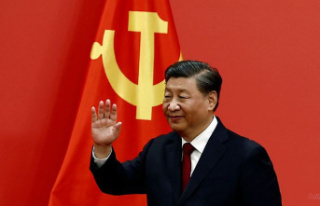A conference on the reconstruction of Ukraine is taking place in Berlin this Tuesday, to which Oleksandr Sushko is traveling as a representative of Ukrainian civil society. Federal Chancellor Olaf Scholz invited. Sushko assumes that the federal government wants to "show a certain level of ambition" at the conference.
Oleksandr Sushko is the head of Ukraine's International Renaissance Foundation, which aims to promote an open and democratic society. The IRF is part of the Open Society Foundations network of US investor George Soros.
ntv.de: Mr. Sushko, does it make sense to plan reconstruction now, when it is completely unclear when the war will be over?
Oleksandr Sushko: Of course, reconstruction usually comes after a war ends. But there is a short-term approach and a long-term approach. Short-term reconstruction is already taking place across Ukraine - in the large areas that have already been liberated: the Kyiv region, Chernihiv, Sumy and now Kharkiv regions. In addition, we must restore the energy infrastructure destroyed by Russia, including hospitals, schools. Winter is just around the corner - we need to make sure people can stay indoors. Otherwise, we will see another huge wave of people leaving the country.
Is it already clear how the reconstruction should be organized in practice?
The long-term approach is about planning strategically and creating the necessary legal foundations in Ukraine now and preparing the institutions for the reconstruction process. We also need commitments from our international partners so that we can start reconstruction immediately after the end of the war. This is a kind of work in progress: there is no final plan for it yet, because this is work that has to be done jointly by the Ukrainian government, the Ukrainian parliament, Ukraine's civil society and international partners.
Do you worry that there might be a problem with corruption in the reconstruction program?
Corruption has been associated with Ukraine for many years. But I don't think classic corruption is the biggest risk. Nevertheless, these plans should not be drawn up by the government alone. That would be convenient for the government, but it would not be inclusive and transparent enough, and probably not good enough, especially not good enough for international donors and investors.
So I don't think there will be one central body for reconstruction, but at least one institution should be set up: a fund that collects the promised money. This fund should be administered by Ukraine, but it would need to be overseen by a body composed of representatives of donor countries and Ukrainian civil society.
What are your expectations for Berlin?
I expect that on Tuesday the German government will announce its own vision of the process, perhaps even some sort of leadership role for Germany to play in this process, which would be very welcome. By the way, there will be a follow-up event on Wednesday, hosted by the German Marshall Fund and the Open Society Foundation, which also includes our Renaissance Foundation. There we want to talk to stakeholders, civil society and business and take stock of the big event on Tuesday.
The federal government appears undecided as to whether it can or wants to play a leading role in the issue of European aid to Ukraine. How do you assess the role of Germany?
That's difficult for me to judge. But the mere fact that the German government initiated this conference means that they probably intend to show a certain level of ambition. Chancellor Scholz recently said that Ukraine needs a Marshall Plan, i.e. a reconstruction plan comparable to that after the Second World War. That's a good point. I hope to get more details on Tuesday. When it comes to military support, which is also urgently needed because otherwise Ukraine cannot survive, then the lead certainly lies with the United States, which has more capacity in this area. But when it comes to economic support, I think it would only be natural for Germany to take the lead.
In your opinion, is there a risk that Russia will take a reconstruction plan as a provocation?
If so, there is nothing we can do about it. The only thing we can do is defeat Putin. For Putin, the whole of democratic Europe is a problem. That is why he is trying to destroy not only Ukraine, but European democracy as a whole.
Should Ukraine demand reparations from Russia after the war?
We do not know what the situation will be like after this war, but there is no doubt that Russia has caused significant damage in Ukraine. The material losses are estimated to be in the hundreds of billions of euros. The West has already taken measures to freeze Russian assets and funds, including funds from the National Bank of Russia. This could be a basis for compensation payments. It would require some political and legal process, but in the end I think a large part of that money should go to Ukraine to help with reconstruction.
Hubertus Volmer spoke to Oleksandr Sushko












